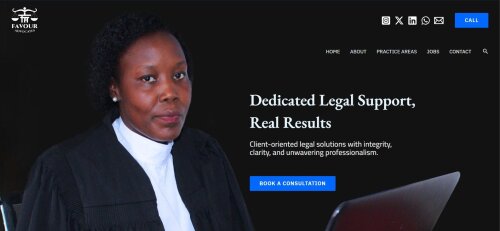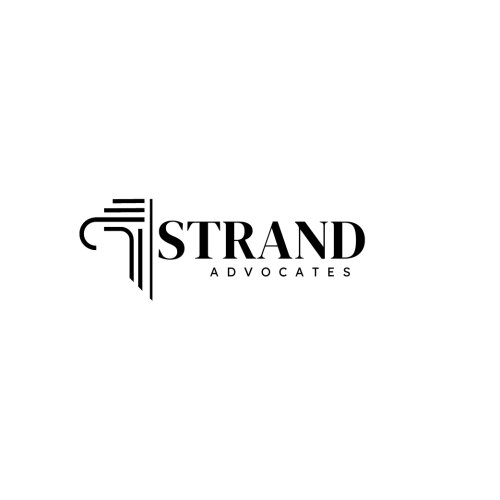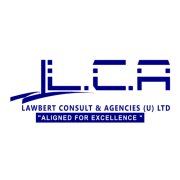Best Trusts Lawyers in Uganda
Share your needs with us, get contacted by law firms.
Free. Takes 2 min.
Or refine your search by selecting a city:
List of the best lawyers in Uganda
About Trusts Law in Uganda
Trusts are legal arrangements where one person, known as the trustee, holds and manages property for the benefit of another, known as the beneficiary. In Uganda, trusts are regulated by the Trustees Act (Cap. 164), among other legislative and common law precedents. Trusts can serve various purposes, including managing family assets, charitable purposes, or estate planning. Though not as commonly utilized as in other jurisdictions, trusts are a growing area of interest for wealth management and asset protection in Uganda.
Why You May Need a Lawyer
There are several situations where legal help might be necessary when dealing with trusts:
- Estate Planning: Crafting a trust to ensure that your estate is managed and distributed according to your wishes after your death.
- Asset Protection: Establishing a trust to protect family assets from potential creditors or during legal disputes.
- Charitable Trusts: Setting up a trust for charitable purposes requires careful legal structuring to ensure compliance with local laws.
- Disputes Resolution: If conflicts arise regarding the terms or management of a trust, legal representation can help mediate and resolve these disputes.
- Compliance and Formalities: Understanding and navigating the compliance requirements, such as taxation issues and formal filing requirements.
Local Laws Overview
Trust laws in Uganda are governed mainly by common law principles, with the Trustees Act providing the legislative framework. Key aspects include:
- Formation: Trusts can be created formally via a written trust deed or informally in some cases, but formal documentation is highly encouraged.
- Trustees: Trustees are required to manage the trust’s assets in accordance with the trust deed and for the benefit of the beneficiaries.
- Duties and Responsibilities: Trustees have fiduciary duties to act prudently and in the beneficiaries' best interests.
- Beneficiaries: Beneficiaries can be individuals or entities, and their rights will be determined by the terms of the trust.
- Taxation: Trusts may have particular tax implications for both the trustees and beneficiaries, necessitating careful financial planning.
Frequently Asked Questions
What is a trust?
A trust is a legal arrangement where a trustee holds and manages assets for the benefit of one or more beneficiaries.
Who can be a trustee in Uganda?
Any competent individual or legal entity can be a trustee as long as they are not declared bankrupt or legally incapacitated.
Can I change the beneficiaries of a trust?
Beneficiaries can be changed or removed according to the terms specified in the trust deed.
Are trusts registered with the government in Uganda?
While not all types of trusts require registration, some-especially charitable trusts-may need to be registered with relevant authorities.
How are trusts taxed in Uganda?
Trusts may have specific tax implications under Ugandan law, affecting both the trust itself and the beneficiaries.
How long can a trust last?
The duration of a trust can vary, but many are set up to terminate when certain conditions are met or after a specified period.
What happens if a trustee breaches their duties?
Beneficiaries may have legal remedies, including seeking court intervention to remove the trustee or seeking compensation for losses.
Can a trust own property?
Yes, a trust can own various types of property, including land, buildings, and intellectual property.
Is a lawyer required to create a trust?
While not legally required, engaging a lawyer is advisable to ensure that the trust is properly structured and compliant with local laws.
Can trusts be used for business purposes?
Yes, trusts can be utilized for business purposes, such as managing family businesses or holding corporate shares.
Additional Resources
For further information and assistance, consider contacting these resources:
- Uganda Law Society
- Ministry of Justice and Constitutional Affairs
- Uganda Revenue Authority
Next Steps
If you need legal assistance with trusts in Uganda, consider the following steps:
- Consult a Lawyer: Seek out a lawyer specializing in trust law to provide tailored advice and support.
- Gather Documentation: Prepare any relevant documents, including existing trust deeds, property titles, and identification documents.
- Initial Consultation: Arrange an initial consultation to discuss your needs and explore your legal options.
- Engage Legal Services: Once you’ve found a suitable lawyer, formally engage their services and begin working on your trust-related matters.
Lawzana helps you find the best lawyers and law firms in Uganda through a curated and pre-screened list of qualified legal professionals. Our platform offers rankings and detailed profiles of attorneys and law firms, allowing you to compare based on practice areas, including Trusts, experience, and client feedback.
Each profile includes a description of the firm's areas of practice, client reviews, team members and partners, year of establishment, spoken languages, office locations, contact information, social media presence, and any published articles or resources. Most firms on our platform speak English and are experienced in both local and international legal matters.
Get a quote from top-rated law firms in Uganda — quickly, securely, and without unnecessary hassle.
Disclaimer:
The information provided on this page is for general informational purposes only and does not constitute legal advice. While we strive to ensure the accuracy and relevance of the content, legal information may change over time, and interpretations of the law can vary. You should always consult with a qualified legal professional for advice specific to your situation.
We disclaim all liability for actions taken or not taken based on the content of this page. If you believe any information is incorrect or outdated, please contact us, and we will review and update it where appropriate.
Browse trusts law firms by city in Uganda
Refine your search by selecting a city.














